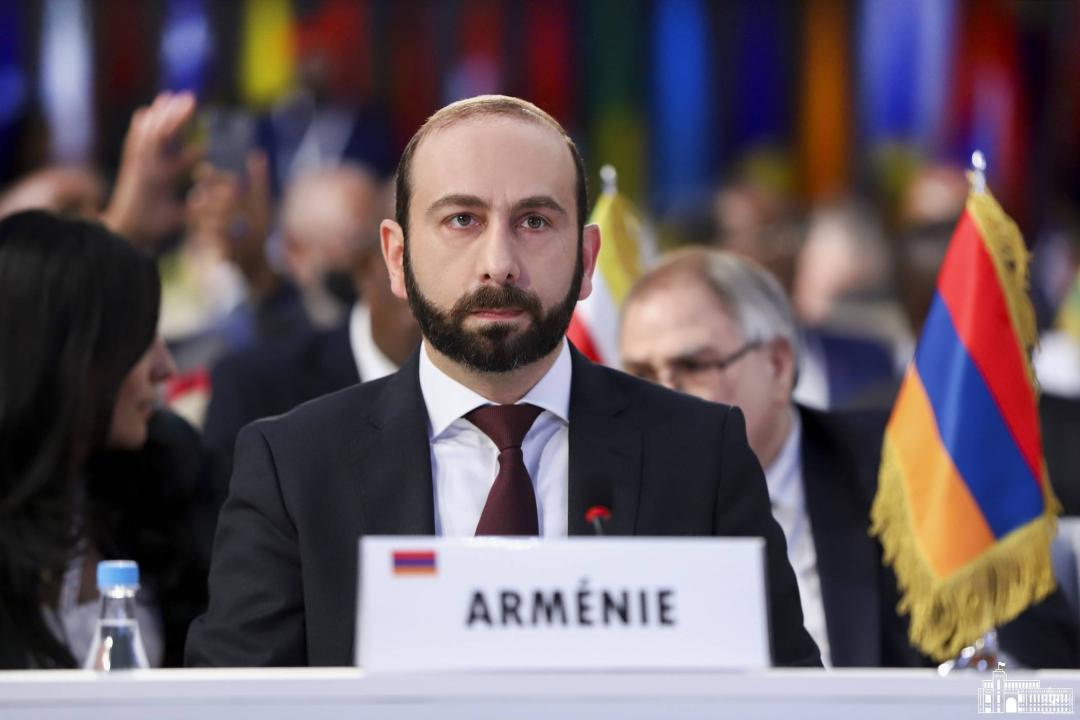
Armenian FM Highlights Key Principles and Challenges in Negotiations with Azerbaijan

In 2023, Armenia actively participated in negotiations with Azerbaijan to normalize relations, stated Armenian Foreign Minister Ararat Mirzoyan during a press conference on January 23. He highlighted that these negotiations encompassed various aspects, such as the overall peace process, the signing of a peace treaty, the initiation of border delimitation, and the removal of the transport and economic blockade in the region.
In this context, Mirzoyan reiterated the necessity for both Armenia and Azerbaijan to mutually recognize each other's territorial integrity.
“In addition, the delimitation of the border [between the two countries] should be carried out based on the official maps of the USSR, which have solid legal foundations. We have repeatedly spoken about the 1974-1978 maps as the most recent maps that reflect these principles. Previously, the Azerbaijani side proposed using the maps of the period from 1974 to 1990. We [i.e., Armenia] suggested that this might be acceptable. But, based on the recent statements of the President of Azerbaijan, it can be said that there is a regress in Azerbaijan's position on this matter. According to the Almaty declaration, all post-Soviet countries—no one made reservations later—accepted that all administrative borders of Soviet republics were already recognized as borders of independent republics. Armenia and Azerbaijan confirmed this principle in Prague in 2022, as well as during subsequent meetings,ʼʼ the Armenian FM outlined.
Ararat Mirzoyan further highlighted the importance of the third principle, which involves unblocking the region's transport and economic communication channels based on countries' sovereignty, jurisdiction, and reciprocity. Mirzoyan acknowledged successful discussions with Azerbaijan, leading to a mutual understanding. However, he noted a setback, particularly following Azerbaijani President Ilham Aliyev's recent press conference, introducing differences in approach on key issues despite previous mutual agreement on certain wording in the peace treaty text during high-level meetings between Yerevan and Baku.
Mirzoyan clarified that Armenia has not committed to any obligations regarding a "corridor" in any document, including the November 9, 2020 agreement. He strongly emphasized the inadmissibility of ''corridor logic'' in this context. He expressed Armenia's readiness and interest in unblocking communications in the region, extending beyond the Nakhichevan-Azerbaijan route to encompass all routes that Armenia intends to use.
Mirzoyan pointed out that the trilateral statement of November 9, 2020, explicitly does not involve the participation of third countries. It directly states that Armenia is responsible for ensuring the safety of the route. The Armenian FM affirmed readiness and capability to ensure the safety of both cargo and people.
Regarding Russian proposals regarding Armenian-Azerbaijani negotiations, Ararat Mirzoyan said that in August 2022, Russia put forth proposals that included indefinitely postponing the status of Nagorno-Karabakh. Armenia agreed to these proposals at the end of August, but Azerbaijan expressed disagreement. Subsequently, in September 2022, Azerbaijan initiated an attack on the sovereign territory of Armenia. Mirzoyan explained that Armenia sought assistance from Russia, and the Russian response indicated difficulties in assessing the violation of Armenia's sovereign territory, citing the unclear delineation of the border in that area. In October 2022, Armenia and Azerbaijan signed a quadrilateral statement in Prague, agreeing to conduct border delimitation based on the Almaty declaration. According to Mirzoyan, Russia initially did not have a clear record of Azerbaijan violating Armenia's border. Mirzoyan further mentioned that he is unaware of any new Russian proposals related to Armenian-Azerbaijani negotiations.
According to the Armenian Foreign Minister's announcement, currently, there is no agreement on a new meeting between the leaders of Armenia and Azerbaijan․ Mirzoyan confirmed the existence of direct communication between the two parties, not only at a high level but also "on the ground." However, Mirzoyan noted that the positive trend observed in previous meetings did not continue. He highlighted a complete regression, especially in light of Azerbaijani President Ilham Aliyev's recent statements regarding border delimitation, the use of new borders and maps, and claims that Azerbaijani forces will not withdraw from the occupied territories of Armenia.
Responding to a question about the possibility of increased tensions during the US presidential elections and the European Parliament elections, periods when international partners may be focused on their domestic agenda, the Armenian official stated that he sees a risk of escalation even at this moment: “At least the rhetoric we’ve witnessed in the Azerbaijani president’s interview doesn’t allow us to be off guard, not even for a second.”
Ararat Mirzoyan also referred to the opening of the Armenian-Turkish land border. He noted that an agreement was reached in Tehran with Turkish Foreign Minister Hakan Fidan to open the Armenia-Turkey border for citizens of third countries and those holding diplomatic passports. However, there has been no tangible result in implementing this agreement," Mirzoyan stated during the press conference.
See Also


Armenia Records 5.9% GDP Growth in 2024, Missing 7% Goal

Yerevan Balances Strategic Ties with Both US and Russia, Says Foreign Minister

FM Mirzoyan: Peace Deal with Azerbaijan Is Within Reach

Pashinyan and Erdogan Hold Call, Reaffirm Commitment to Ongoing Dialogue

